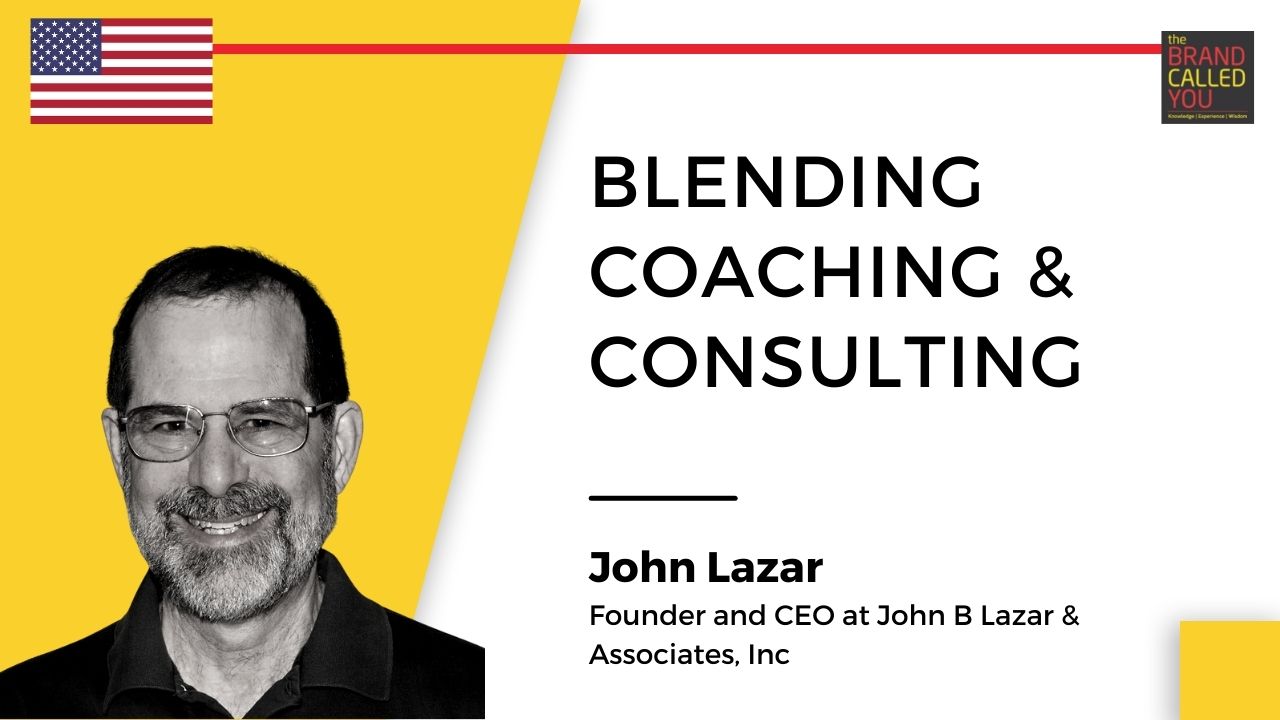John Lazar, Founder, and CEO at John B Lazar & Associates, Inc
John has made over 100 presentations at local, regional, and national/international events since 1985. He posts an almost weekly blog on LinkedIn on topics of performance improvement and leading a good life.
Podcast
Overview
Not much time ago, coaching of an individual was either done by a family member, or by an office senior who took a liking for that particular individual. However, coaching now has become an integral part of organizations. Organizations set up workshops and events where professional coaches coach their employees. It increases their efficiency and productivity.
For this episode of The Brand Called You, we have invited a professional coach, John Lazar, to talk to us about coaching and its growing relevance.
John is the founder and CEO of John B. Lazar and Associates Incorporated, which is a coaching and consulting firm.
John has also served in the Vietnam Navy. He is a Vietnam war veteran in the 1967-1970 period.
What are blended solutions and why is it needed?
John tells us that he, at John B. Lazar and Associates Incorporated, works under three major service lines. They are:
- Leadership and Executive Coaching
- Team development
- Blended solutions
Explaining blended solutions, John tells us that it is a combination of coaching and consulting. As many organizations deal with complex and messy problems. There are multiple things that contribute to a problem. By blending solutions, John feels that he could give his clients the best service that is also cost-effective.
What made coaching become professionalized and monetized?
John feels that coaching has a greater recognition now than ever before because a senior doesn’t necessarily have all the answers. John also feels that the world is going faster and it is becoming more and more complex to deal with. There are more perspectives that one has to take into consideration. The expectations from an individual are growing. At that time, the individual feels the need to have a good partner to be able to move forward with. This is why the need for professional coaching is increasing now.
What did John learn about coaching from the Navy?
John tells us that he joined the Navy because he felt a lack of discipline in his life. He believed that the Navy would help him get more disciplined. However, the Navy didn’t play a big role there. He further tells us that while he was in Florida with the Navy, he met a civilian named Lyle. Lyle befriended John and made him realize his worth. That day, John declared to himself that whenever he gets out of the Navy, he is going to complete his studies and help people the way Lyle helped him.
John then got out of the Navy and graduated in Clinical Development Psychology. He tells us that he has been living under that declaration for more than 50 years now.
Evaluation of a good catch
John believes that evaluating whether an individual has a good coach or not is highly subjective. However, the things one can notice might be:
- Chemistry
One has to decide whether you are feeling okay with that person or not.
- One also has to decide how well their approach is and how well it fits in the individual’s case.
- The coach should be trustworthy and should keep his word.
- Ultimately, the coachee should judge whether they are making progress together or not.
How can a coach benefit an individual?
A coach can help a coachee with:
- Self-awareness
- Challenging old assumptions and expectations
- Thought Partnership
- Learning things of new areas
- Accountability partner
- A safe space for respectful listening
The difference in the approach of coaching an emerging leader and coaching a senior leader
John tells us that it won’t be much different from each other at the fundamentals. For both of them, he would need to understand them in their context and not what he thinks of their lives. He would require past data from their organizations to understand what worked for them and what didn’t work for them in the past. Then he would be required to do some personality assessment with them using different tools. He would not just collect data for the sake of collecting data but also for the conversations that it will provoke. These things would become the backdrops and inputs for coaching them.
Profile
John Lazar, MA, MCC, CPIF, IOC Fellow, has been working to improve individual, group/team, and organizational performance since 1977.
After working for AT&T and Hale Associates as a Performance Improvement Consultant, he started his coaching and consulting practice in 1995. In addition, he co-owned and was executive editor for the International Journal of Coaching in Organizations (IJCO), which published 32 issues and over 175 articles that bridged coaching and adult development theory, research, and application.
A member of the International Society for Performance Improvement (ISPI) since 1981, he is completing his second term as a Board Director, Co-Chair of the Collaboration Committee, and Chair of the Governance Committee.


